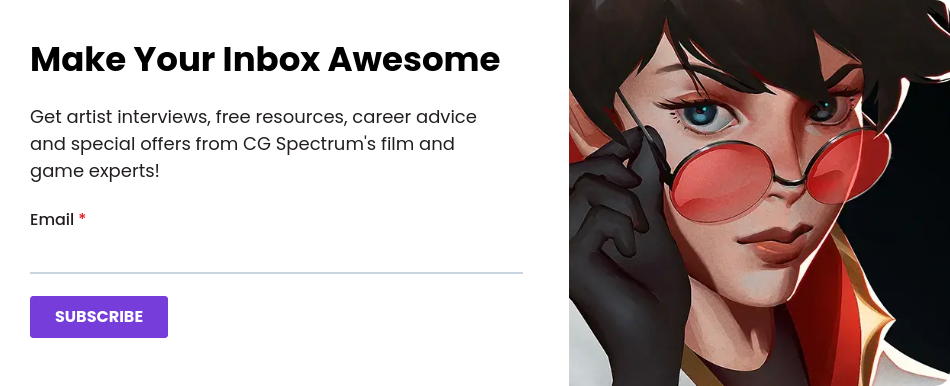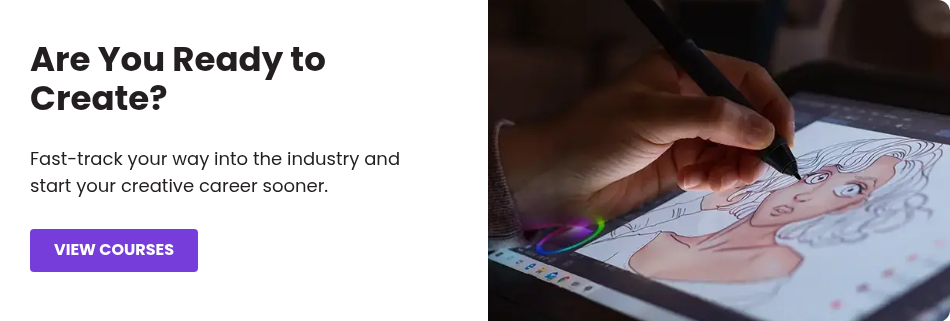Meet Indrek Oper
As a kid, Indrek loved to draw and play video games. Fast forward to adulthood, working full time as a graphic designer and married with 3 kids, Indrek's love for art and games reignited on a whole new level when he picked up The Witcher 3. The game's visuals inspired him to make the leap and pursue his true passion: concept art for games.
CG Spectrum's online concept art courses allowed Indrek to study from his home in Estonia while also juggling work and a family. It took serious dedication, hard work, and many late nights, but Indrek graduated last month! 🎉
He shares how he developed his artwork, what he learned in the course, and how having industry professional Eric Wilkerson as a mentor has helped him grow as an artist.
Indrek, tell us a bit about your journey and how you came to study digital painting at CG Spectrum.
My story probably does not differ from many other beginner artists out there. I always felt that I was doing an OK job with drawing, but as much as I loved doing it, I had this hesitation or fear in the back of my head saying: why bother, just watch TV and eat a sandwich, you don't have what it takes.
So for a long time I kept myself preoccupied with other less fulfilling things, but still kept admiring beautiful illustrations and concepts made for games.
The trigger to man up and start pursuing my dream was when The Witcher 3 came out. I loved the game and the art around it. My favorite parts were the loading screen illustrations. They inspired me to take further steps.
During that time I bounced around between different courses, finished trade school as a graphic designer, and discovered two awesome Estonian artists named Kait Kybar and Ed Labetski who I probably annoyed to death with my ignorant questions regarding the field and totally out of the ballpark concepts which I presented them, but I was determined to start my journey, no matter what. (Luckily they have been very supportive throughout!)
I had been thinking about joining an art school whether it be online or offline for a long period of time before I found CG Spectrum.
The reason I chose this school is for purely practical reasons. I do not have the capacity for a full-on daytime school as I am a married man with 3 kids and need to make money in the daytime. I also do not want to spend countless hours watching videos about concept art by different creators that get me more confused.
So the only way I saw possible to do this, was by getting to the source. CG Spectrum has the flexibility I needed. It was still tough at times when I was loaded with graphic design projects and had to present homework for the next class the next day while hadn’t even started yet. I had to cut sleeping time quite a lot but I didn't mind it at all as I was doing something I love.
I enjoyed the weekly feedback sessions a lot because I learned a lot from them. My mentor Eric Wilkerson was simply awesome and contributed a lot more to my artistic growth than was probably asked of him.
The weekly deadlines were a good way to leave my comfort zone and push myself in order not to let down my mentor, but foremost not to let myself down.
It was just amazing to see how the mind of a seasoned illustrator works. This got me silently squealing every time I received feedback, or was proposed changes or story elements. I was amazed with the stuff my mentor came up with.
I tried to scoop it all in during every session we had, but as for the biggest takeaways, I would mention the magnificent ball exercise [in this exercise, students break down digital painting into a step by step numerical process. The information gained from this numerical value painting exercise can be applied to painting anything], and the phrase "put in the hours". Those two combined are magic.
Tell us about a few pieces you created in the concept art course: what was your process and what challenges did you face?
Every project I start is still a bit scary at first. It’s easier for me to work with a specific assignment, but still keeps me on my toes throughout the process as I want to get the groundwork as spot on as possible so I can completely enjoy the lighting and colouring part with a cup of coffee in my hand and warm slippers on.
I still need to improve everything from thumbnailing and linework to rendering, but the biggest struggle every time was to get the values right in the value painting stage. It was hard to determine a solid and understandable light source for every piece. Something was always off and just annoyed me. It’s still an issue to overcome, but in case of this "Neptune" piece I had the chance to "put in more hours" for value and light studies and I am fairly happy with the end result.

Still, I wanted to make things more believable for the next assignment, but faster.

We had to put together a weapon that could be used in games or film. At first I started photobashing different elements together for later linework reference and ended up doing the weapon in profile view.

The end result was supposed to be in ¾ view, and disappointed by the doodle I produced, I decided to try 3d to win back the time I lost and speed up my future workflow.
This meant skipping the perspective and value painting part and it felt a bit like skipping legs day, but it’s still a good way not just to make up for the cracks in my foundation, but for learning as well.
So I started putting basic shapes together in Blender and added different light schemes for reference. I watched some tutorials on how to get holes inside other shapes etc. and ended up with the "Inquisitor".
As I am fond of post-apocalyptic themes, I then tried to give it a scrappy but sleek look as if it were put together in some cult bunker by a crazy preacher man who happens to be a design enthusiast.
The creepy religious part just popped in my mind when I painted the cross shaped kill counts.
This android assignment was an ongoing project throughout the course, but I started it way before I joined the school. I had the chance to do a character concept for a client in the charity field and this was basically my first gaming related job, and it still is ☺.

Pressure was on. I used the leftover sketches as a base for different assignments during the course and got to finalize it near the end.
I can clearly see how I have evolved alongside with the character design and how beneficial the concept art course really was.
The character seemed a job well-done to me at the start, but thanks to the mentors and school community I see things differently now.
Now that you've dedicated more time to developing your artistic skills, how would you describe your style?
I wouldn’t say that I have developed a style yet as my portfolio is still in its baby shoes together with my fundamental skills, but so far I have enjoyed creating pieces with a shady or darker vibe to them. I hope it conveys outside of my own mind and I am not just imagining it ☺.
The outcome is pretty much inspired by the music I listened to which in these cases was orchestral villain beats and the Doom Eternal soundtrack. It’s a good way to get my imagination rolling as well in terms of creative blocks. It gets me into flow state pretty well when I add a soundtrack to an assignment or brief.
You also have an interest in photography: how does this help when creating concept art?
I think I have not fully utilized the experience I have with a camera and the helpfulness it has on gathering unique reference materials in the concept art area just yet.
But being used to looking through the lens has helped solidify the knowledge I gained from the concept art course in terms of how I can and should depict concepts in a more dynamic and understandable way.
At least I think I know what to do next, but it’s still kind of a wrestling match between the experience I have with a camera, the camera in my head, and my current skill level in drawing to produce the image I initially imagined.
How has your graphic design background influenced your art? What are you enjoying the most about creating concept art vs graphic design?
For me, the transition from my day job as a graphic designer to a wannabe concept art Batman in the evening is quite refreshing and liberating at the same time.
My professional experience as a graphic designer is largely limited to being an in-house designer for a textile bedding company that had a pre-developed CVI (Corporate Visual Identity) at hand, so my job was to implement the visual guidelines to everyday use and I didn't really have as much creative freedom as I would have liked.
Of course I do freelance work for other companies where I can let my imagination fly, but a logo design for example is not as invigorating as painting a steampunk tentacle-faced god of the seas while listening to evil film music.
In general I feel the workflow is quite similar to the graphic design problem solving process. I am already familiar with working with briefs, interacting with clients, researching and gathering reference, brainstorming ideas etc. but at this beginning stage of my concept art path, I feel that this is the next level of design I need to pursue.
What personal projects are you working on at the moment?
I am currently working on a series of characters, props, and environments that I will be using to create a more focused portfolio.
This kind of means going back to my roots and source inspiration.
Motivation tends to stick around when I am working on small tasks that lead me towards the final boss of my goals.
When I try to chew off more than I can handle per day, I get cranky.
What are your plans now that you have graduated?
I will be continuing with graphic design as it pays the bills right now, but I will be working on the concept art portfolio as much as I can to eventually land my dream job.
In the near future I would like to try book cover illustrations or working remotely for a game studio in a junior position to get more insight and experience.
Any advice for current concept art students or someone wanting to switch from graphic design to concept art?
I don't think I’m qualified enough to give advice to anybody in this stage, but for the current concept art students I would say keep calm and put in the hours.
See more of Indrek's work on Artstation or check out the online digital painting course he took at CG Spectrum.
Learn illustration and concept art from award-winning artists!
Turn your artistic skills into a career! Learn the fundamentals of concept art and digital illustration for film and games from mentors who have worked with clients like Blizzard Entertainment, Marvel, and Disney Publishing!

Related Links





